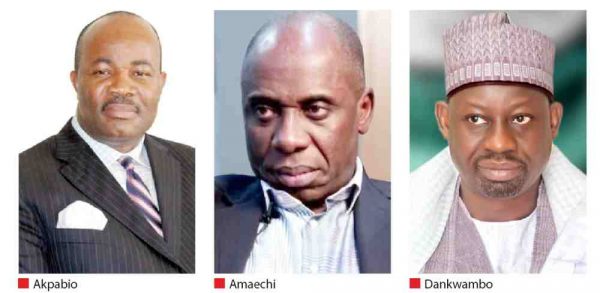
Since the return of democracy in1999, all the transitions in 2003, 2007, 2011 and 2015 had seen the emergence of some godfathers who either dismantle those already calling the shots, or fiercely competed with them. Evidently, 2019 is not an exception, as brand-new shot-callers are emerging.
Before the advent of the Fourth Republic, there were very few political godfathers because of long period of military incursion in Nigeria’s political firmament. And in the build-up to the return of democracy in 1999 following the death of General Sani Abacha in 1998, General Abdulsalami Abubakar who succeeded him initiated the transition that led to the release of some political prisoners. They included General Olusegun Obasanjo, who rode on the influence of generals Ibrahim Babangida and T.Y Danjuma, in addition to other powerful Second and Third Republic politicians to give birth to a comity of godfathers that saw the realization of the 1999 transition.
Within the time under review, the likes of Obasanjo, Chief Olu Falae, Atiku Abubakar, Bola Tinubu, Goodluck Jonathan, Danjuma Goje, Ahmed Yerima, George Akume, David Mark, Bukola Saraki, Rabiu Kwankwaso, Abdullahi Adamu, Obong Victor Attah and a host of others called the shots in their climes, making decisions as to who gets what, where and even when. However, nearly 20 years down the line, the trend has continued with some politicians succeeding in taking over entire party structures in their states, even succeeding in anointing key candidates ahead of the 2019 elections.
Akpabio:
After forcing his political godfather, Obong Victor Attah into retirement, Senator Godswill Akpabio, fondly called ‘Uncommon Senator’ has been in charge of the political machinery of Akwa Ibom State since his early days as governor in 2007. The 56-year-old lawyer was brought into the political scene of the oil-rich state in 2002 when Victor Attah, the then governor of the state appointed him as the Commissioner for Petroleum and Natural Resources.
As the tenure of Attah was elapsing, Akpabio dribbled his way to emerge as the candidate of the Peoples Democratic Party (PDP) in 2006 and won the 2007 governorship election in the state. In 2011, he won his second term and completed his tenure in 2015. Singlehandedly, he brought in his successor at the Akwa Ibom State Government House in the person of Udom Gabriel Emmanuel in 2015. But despite their long journey in the slippery political pathway, something went wrong midway and they are no longer on the same page politically.
In August this year, Akpabio, who represents the Akwa Ibom North West Senatorial district dumped the PDP and resigned as the Minority Leader of the Senate, a position he occupied for 26 months. The rally to welcome him to the APC which was held at the Ikot Ekpene Township Stadium in his home state was attended by a veritable who’s who of the APC, including the leader of the party, Asiwaju Bola Ahmed Tinubu and National Chairman, Comrade Adams Oshiomhole.
With the APC structure in his palms, Akpabio anointed Nsima Udo Ekere, the current MD/CEO of the Niger Delta Development Commission as the governorship candidate of the party for next year’s election. If Ekere defeats Emmanuel then, Akpabio will consolidate his hold on the state. However, if he fails, he would most likely join the league of Rochas Okorocha (Imo), Abdulaziz Yari (Zamfara) and Abiodun Amosun (Ogun) who would have joined the crop of emerging godfathers had they succeeded in clinching seats for their candidates in their states.
Amaechi
The claim that ex-Rivers State governor and Minister of Transportation, Rotimi Chibuike Amaechi is an emerging Godfather of the APC in Rivers State is not far-fetched. His emergence came to the limelight in 2015 when he singlehandedly installed the MD of NIMASA, Dr. Dakuku Peterside, as the governorship flag-bearer of APC against the wishes of the likes of Senator Magnus Abe who was thought to be more qualified to fly the party’s flag in 2015.
The issue of who flies the party’s gubernatorial flag in 2015 would have caused a big crisis in the party, but Amaechi had his way as he succeeded in installing his preferred candidate.
When Peterside was defeated by Governor Wike in that election, Amaechi still confirmed his dominance, as he used his influence in the presidency to make Peterside MD of Nigerian Maritime Administration and Safety Agency (NIMASA).
Other APC members in the state who are loyal to him were compensated with juicy jobs in Federal Government parastatals and boards of federal government agencies. He also nominated and ensured that some of his party loyalists got both state and national assembly positions.
Amaechi’s clout also played out in May during the APC ward congresses, as he schemed out Senator Magnus Abe’s supporters from the congresses and eventually succeeded in installing the Flag Ojukaye Amachree-led state chapter of APC. As if that was not enough, he against the wishes of the major stakeholders of the party in the state nominated and installed his closest ally, Arch. Tonye Dele Cole as the party’s governorship flagbearer for the 2019 election. The emergence of Cole has become a litigation matter between him and Senator Abe just as the Supreme Court granted Abe’s prayer and upheld the State High Court’s verdict that nullified the May ward congresses conducted in the state. This, however, did not change anything on the nomination of Cole as even the leadership of the APC at the national level maintains the status quo.
Amaechi also singlehandedly nominated and installed the party’s senatorial candidates in the three senatorial districts as well as the eight House of Reps slots in the state.
Dankwambo
Prior to his election as Gombe State governor in 2011, Ibrahim Hassan Dankwambo was better-known as a technocrat. He was serving as Accountant General of the Federation when then-governor Danjuma Goje persuaded him to resign and contest for the office of the governor, which he eventually won.
Even though certain people allege that it was strictly a business affair between the two, some political observers in the state said being a novice in politics, Goje handpicked Dankwambo to succeed him under the intention that he (Goje) would continue to run the state by proxy from Abuja. However, not long after he took over power, Dankwambo started distancing himself from Goje and allegedly orchestrated petitions that started Goje’s ordeal with the EFCC.
 2019 new godfathers emerge
2019 new godfathers emerge
The sour relationship between the erstwhile godfather and godson is believed to have nudged Goje out of the PDP in 2014, to the then newly-registered APC. Despite the falling out, Dankwambo survived the 2015 ‘political tsunami’ that saw APC taking over PDP-controlled states in the north.
Pundits say Dankwambo’s political credentials have made him a sort of ‘political compass’ who now decides who gets what in Gombe State, especially within PDP circles. For instance, despite stiff opposition and protest from executive and leaders of the party, he singlehandedly handed over the PDP gubernatorial ticket to his anointed candidate, Senator Usman Bayero Nafada.
Dankwambo also nominated two senatorial, six House of Reps, and 24 State House of Assembly candidates. He also reserved a senatorial seat for Gombe-North to himself, which he later picked after he lost PDP’s presidential primaries.
Oshiomhole
Edo State has a history of strong godfathers, being where late Chief Tony Anenih and former governor Lucky Igbinedion, among others, held sway. Now, Comrade Adams Oshiomhole, APC’s National Chairman is a major godfather. After consolidating his gains as a sitting governor, he started dictating the pace in the polity on who gets elective or appointive positions in the state.
Pundits said Oshiomhole’s godfather status became glaring during his re-election in which almost all the APC House of Assembly members were hand-picked by him without input from party chieftains. It is said he singlehandedly picked Governor Godwin Obaseki who was the chairman of his Economic Team.
At present, Oshiomhole has a firm grip on the state. His strength played out during the recent national and state assembly primary elections, even though with some resistance. One of his staunch loyalists, the Speaker of the State House of Assembly, Kabir Adjoto had taken the APC and by extension Oshiomhole to Court for allegedly hand picking Hon. Peter Akpatason as the House of Representative candidate.
The APC women wing led by Aisosa Amadasun had also decried that Oshiomhole’s godfather status was beyond comprehension, saying he who once prided himself as “an apostle of positive change and the curative medicine to godfatherism” is overstretching his boundaries.
Gaidam
Alhaji Ibrahim Gaidam, who served as deputy governor to late Governor Mamman Ali before destiny saw him occupy the Government House after the demise of his boss, is now the de facto landlord in Yobe.
Gaidam, who is about completing ten years in office as governor, was able to establish a political structure that helped him win two successive general elections in 2011 and 2015, addition to the tenure of his late boss which he completed in 2011. He has successfully tested his political strength by having a say in almost all those who secured tickets for various offices.
Besides succeeding in forcing the PDP into political oblivion, Gaidam was able to keep Yobe off the radar of intra-party acrimony, despite the fact that there were grumblings here and there over some of his actions or inaction. However, many analyst have expressed optimism that the governor’s influence would last longer if he allows the incoming administration to have a free hand.
Makarfi
Since he left the Kaduna Government House in 2007, Senator Mohammed Ahmed Makarfi has become a rallying point for many politicians in the state. For some time, his support is what counts for a candidate to win an election. He supported Namadi Sambo to succeed him as governor, and he himself won election to the Senate.
The selection of Sambo as Vice President to President Goodluck Jonathan did little to affect his influence though for a while, Sambo started calling the shots but immediately the Jonathan presidency came to an end, focus shifted back to Makarfi.
Makarfi gained political weight through a combination of record of achievements as governor, a sense of fairness as a leader and by remaining committed to his party, the PDP. His contribution towards rebuilding the PDP which had after the 2015 elections become desolate as it was deserted by notable politicians in the state restored confidence in him.

Makarfi is probably the only politician in Kaduna who can boast of having influence in more than a senatorial zone in the state and politicians know that this in terms of votes is massive. Many aspiring politicians run to him for support, and since he is seen as a fair-minded leader, his words are usually final in settling political disputes.
Though he came out to deny that he was supporting any aspirant during the 2018 PDP governorship primary, it is believed that Isa Ashiru won the ticket of the party largely because of Makarfi’s support. Due largely to his influence, the PDP in Kaduna has been able to weather many storms and has got over its image as a weak and deserted conclave, to a strong party that has regained its verve, looking good enough to challenge the ruling party at the next polls.
Al-Makura
Governor Umaru Tanko Al-Makura of Nasarawa State clashed with ex-governor Abdullahi Adamu over who is the actual political godfather in the state. Though the final winner will only be known after the 2019 general elections, Al-Makura had successfully installed his cronies to various positions during the recent APC congresses, including the gubernatorial, national and state assembly election candidates. He even made attempt to snatch the senatorial seat currently occupied by Senator Adamu but did not succeed.
Although godfatherism is not common in Nasarawa because of the nature and intrigues occasioned by tribal sentiments, Al-Makura as the party leader in the state has succeeded in dictating the direction this time around even though this will only be validated if the PDP does not make inroads.
The governor’s decision using state government machinery and leadership of the party had given the gubernatorial ticket to Engineer Abdullahi Adamu Sule, a move that sparked tension among critical stakeholders.
Al-Makura had also succeeded in dethroning eight serving APC members of the State House of Assembly whose loyalty was said to be in question.
Shettima
In Borno State, Governor Kashim Shettima has succeeded in demystifying his onetime godfather, ex-governor Ali Modu Sheriff who had reigned as the most powerful politician in the North Eastern State until recently. Shettima has also humbled many politicians in the state, including former ministers, ambassadors and many others with high profile influence in the corridors of power in Abuja.
Shettima succeeded in the last APC primaries to have his candidate Prof. Babagana Zulum as the gubernatorial candidate of the APC; he picked the APC senatorial ticket for Borno Central and ensured that Senator Abubakar Kyari and Ali Ndume picked theirs, as well as being instrumental to the emergence of all the House of Reps and State Assembly candidates.
The fact that Shettima has succeeded in taming Sheriff is seen as a feat.
Sheriff had against all odds in 2003 forced a serving governor, Mala Kachallah, who was completing his first term to dump the then All Peoples Party (APP) for Alliance for Democracy (AD).
Sheriff, who took over the APP machinery secured its ticket, defeated Kachallah in the main election and won. He secured re-election in 2007 becoming the first governor to serve two terms in Borno. In 2011, he made Kashim Shettima governor but they soon parted ways. For now, it is clear that Shettima is the main man in Borno.
Wamakko
There is no doubt that ex-governor of Sokoto State, Senator Aliyu Magatakarda Wamakko, has not only remained relevant in Sokoto politics, but is also a determining factor in who becomes what in the state.
Pundits believe that Wamakko will always have an edge over his opponents because of his knowledge about local politics. “He calls people by their names, and he is courteous, which people appreciate,” one of his associates said, saying this has endeared him to many.
Wamakko was instrumental to the emergence of Aminu Tambuwal as governor, and although they played hide-and-seek for long, it is now obvious that they have parted ways.
It would be recalled that after Tambuwal’s defection, Wamakko while reacting to the incidence said, “We will know who is in charge in Sokoto State.” He kept the date by returning to Sokoto and the reception he received indicated that he still retains his massive popular appeal as people lined by the over 11 kilometres airport road to receive him.
While Wamakko would need a godson to sustain his political dominance, the general question being asked in the state is whether he has found one in Ahmed Aliyu, the APC gubernatorial candidate in the state who is still serving as deputy to Tambuwal.
Ahmed has so far garnered considerable experience in public office after serving and Commissioner for Social Welfare in 2007, Commissioner of Health in 2012 and Deputy Governor for over three years.
With the countdown to the 2019 elections inching on, it remains to be seen if these godfathers’ influence will wax, or wane.
-Dailytrust





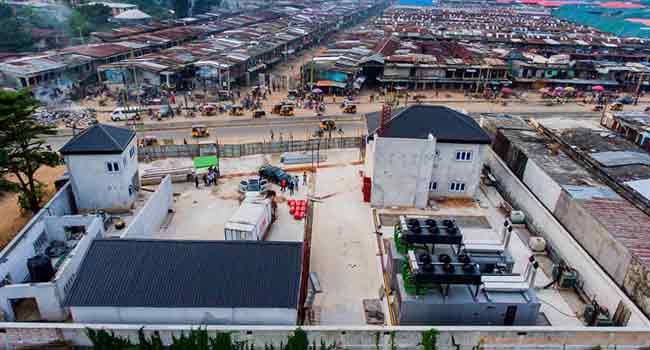
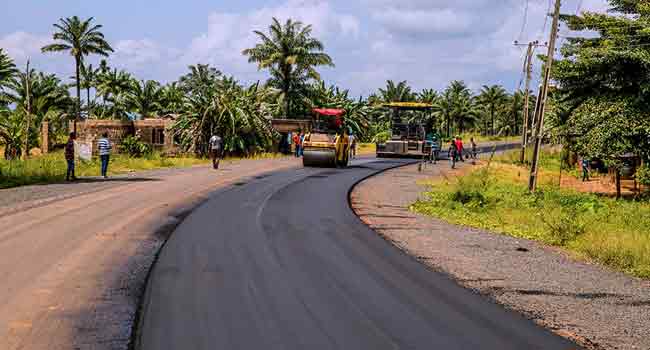
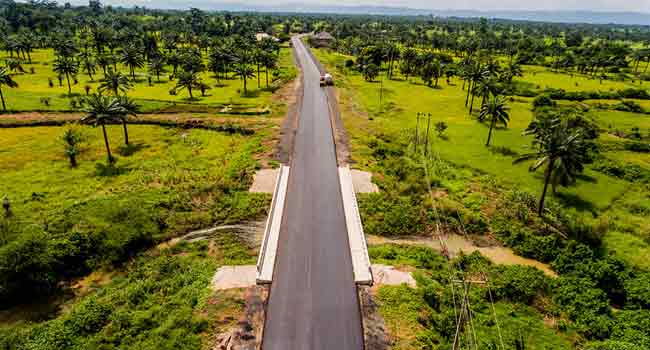
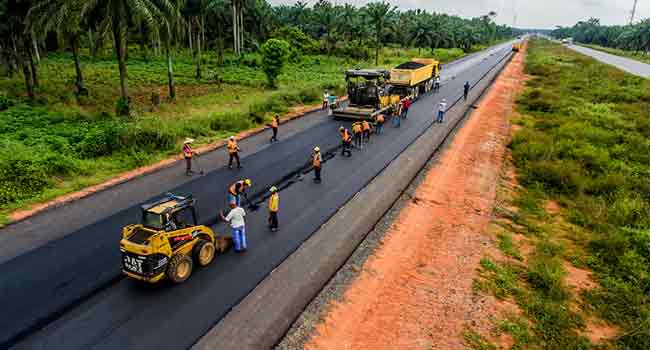
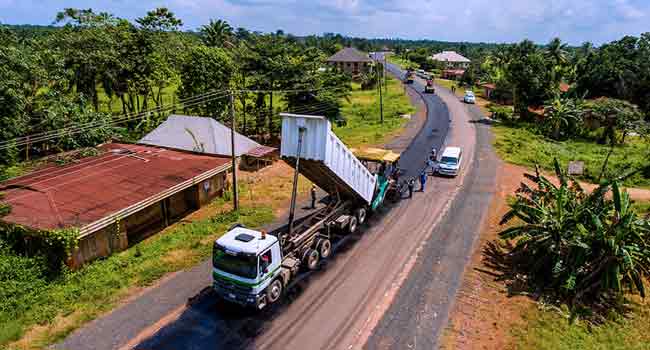
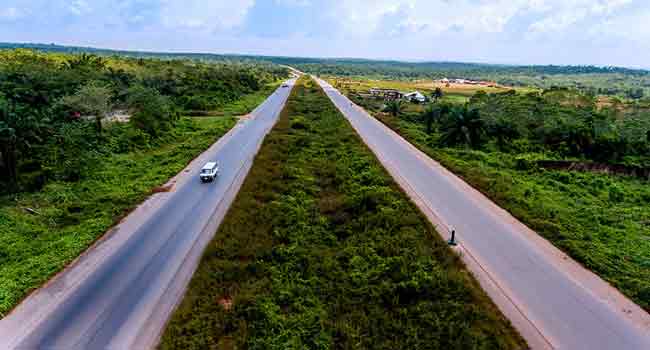













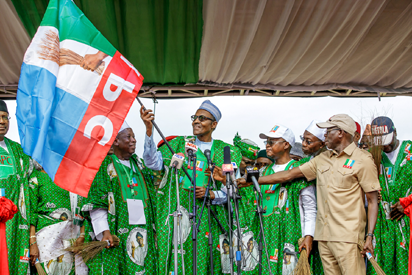 President Buhari presenting the Party Flag to Osun APC Gubernatorial Candidate Gboyega Oyetola accompanied by other party leaders during the Grand Finale of APC Gubernatorial Campaign Rally in Osun State on 18th Sep 2018.
President Buhari presenting the Party Flag to Osun APC Gubernatorial Candidate Gboyega Oyetola accompanied by other party leaders during the Grand Finale of APC Gubernatorial Campaign Rally in Osun State on 18th Sep 2018. •Lorraine Lionheart
•Lorraine Lionheart






 :
: 








 2019 new godfathers emerge
2019 new godfathers emerge

